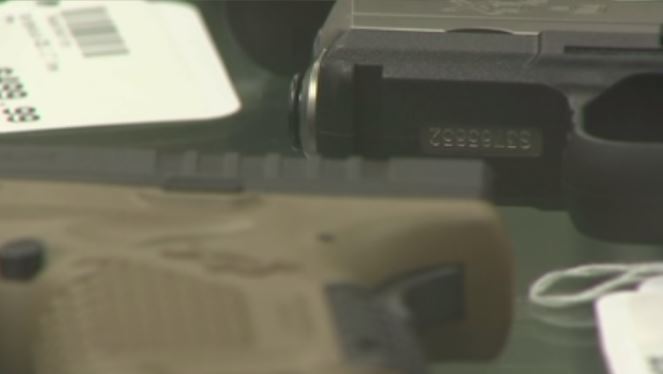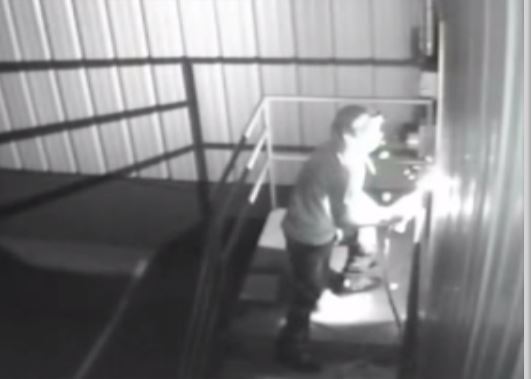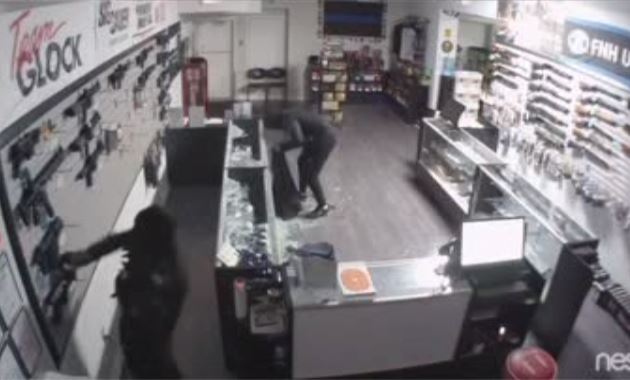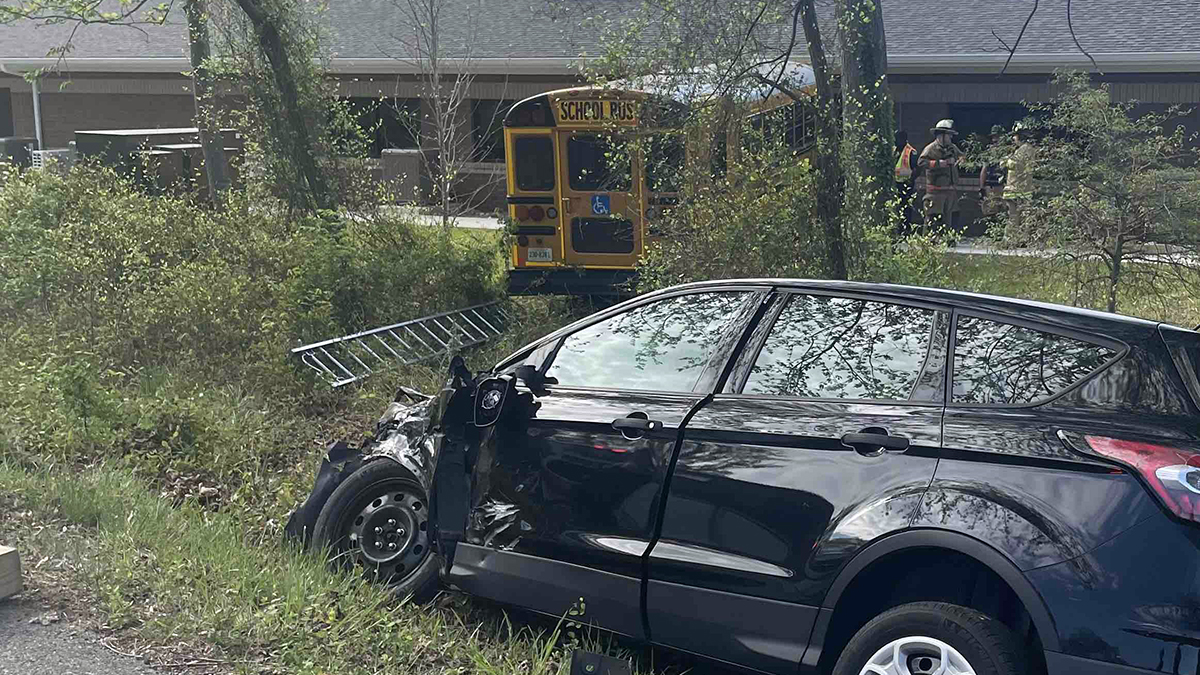Brazen burglars are smashing their way into gun stores across the country. The break-ins are on the rise, and the stolen guns are turning up on our streets.
"The numbers and the trends we’re seeing indicate that this is not going away, it’s noticeable increases in the last several years," said Kevin O’Keefe, chief of operational intelligence for the Bureau of Alcohol, Tobacco, Firearms and Explosives.
No one is tracking stolen guns used in crimes, not even the ATF, which only investigates thefts from gun shops, so the News4 I-Team spent months doing just that -- matching guns reported stolen in our area to the guns later recovered, many during violent crimes.
The News4 I-Team joined more than a dozen NBC stations in teaming with non-profit journalism organization The Trace to document the trail of stolen guns across the country by using the guns' serial numbers.
[[458864593, C]]
Those unique numbers are imprinted on every gun and are important to officers because they help solve crimes. They should be important to all gun owners, because that's also how you can get your gun back if it's stolen.
"I hear of guns getting stolen all the time," said Curt Sebastian, owner of SSG Tactical in Fredericksburg, Virginia, but not from his store.
Local
Washington, D.C., Maryland and Virginia local news, events and information
Last March, his was the third store in three days hit by the same group of thieves.
"They were able to breach this door with a crowbar- breach the glass," said Sebastian, adding that they did not get inside. "With the cage the way we've designed it, they just couldn't break through it."
Just three days earlier, they did get into 50 West Armory in Chantilly.
"They basically smashed the first three cases and they took what was closest to the door," said the store's manager, Scott Wahl.
Thirty-five guns were gone in less than a minute. The thieves eventually got caught, but almost all of those guns are still on the street.

Know Your Numbers
The ATF Branch Chief for Crime Gun Intelligence Frank Occhipinti said once a gun is in the wrong hands it's very hard to get it back.
"We essentially have to wait for a crime to occur," said Occhipinti. "It's on an upward trend in most every city here in the United States, and I think we have our work cut out for us."
So the News4 I-Team requested data from the largest local departments in Washington, D.C., Maryland and Virginia, crunched the numbers and found nearly 5,000 guns reported stolen in the last five years. During the same time, those same departments recovered more than 10,000 guns.
"The impact is quite clear: It's devastating on our communities," said Occhipinti.
We found at least 60 local guns reported stolen in one jurisdiction that turned up in another.
Some even traveled across the country. One gun stolen in Fairfax County, Virginia, was found in Austin, Texas. One from Prince William County, Virginia, was found in St. Charles, Missouri. One gun traveled from Atlanta to D.C., and another made its way from Charlotte, North Carolina, to Alexandria, Virginia.
When an officer finds a gun on a suspect or at a scene, the ATF's national trace center calls the original gun dealer to find out who was the first to buy it. That gives law enforcement officers who are working the case a starting point. Then they go to the next buyer and the next, following the trail in hopes of ending up at the name of their criminal.
The ATF traced nearly 20,000 guns for officers in D.C., Maryland and Virginia just in 2016 alone.
Those traces are impossible to run without a serial number.
Curt Sebastian said every gun owner should record the serial numbers of their weapons in a safe place for insurance purposes and to be able to get their guns back if they're lost or stolen.
"There's a thousand reasons on top of the criminal aspect of it that you need to know where your guns are and record those serial numbers," said Sebastian.
But of the stolen gun reports the I-Team reviewed, nearly 2,000 had no serial number listed.
That means either the owner didn't know it, failed to report it to police or the officers didn't enter it into their reporting system. The ATF said both are critical, adding that every missing gun should also be reported to law enforcement immediately.
"We don't care how many guns you have ... or where they are," said Occhipinti. "What we do care about is public safety."

Brazen Break-ins
That's why the ATF was so concerned about a particularly active group nicknamed the "Blowtorch Crew."
"Very brazen, very reckless. It's pretty scary," said Occhipinti of the group's repeated use of blowtorches to destroy locks on gun dealers' stores.
Records show they also used sledgehammers and rocks to bust their way into more than a dozen stores across the Carolinas and Georgia, hitting some more than once.
They stole 340 guns. Only 87 have been found, most during new crimes.
The ATF said the group advertised the weapons on the internet and sold them out of an Atlanta hotel room. So far, the guns they stole have turned up in eight states and in Washington, D.C., where one gun was used in at least two shootings, including a woman's murder.
When thieves hit United Gun Shop in Montgomery County, Maryland, in March, video showed them smashing glass cases and stealing dozens of guns, some right off the wall, in just 90 seconds.
The store owner told the I-Team he has since made extensive security upgrades, basically turning the exterior of his store into a vault. The ATF applauds those efforts and says smaller stores should even go the extra step of locking up their guns overnight, if possible.
"You don't see jewelry stores at night leave their jewels out in the open," said Occhipinti.
Curt Sebastian said that would be impossible for stores with a large volume of guns, but it's the reason he has a steel cage, an alarm system, cameras and motion sensors in his ceiling.
A gun from the burglary crew he kept out of his store in March was found at a Prince George's County, Maryland, murder scene this summer.
"I wouldn't want to live with myself if any of this stuff got in the wrong hands," he said.

What the Laws Say
There is federal legislation pending to toughen penalties for those who steal from gun stores.
Store owners, who carry federal firearms licenses, are required to report stolen guns to the ATF within 48 hours, but similar requirements for individual gun owners vary by state.
Washington, D.C., requires immediate reporting. Maryland requires gun owners to report a theft within three days. Virginia does not require gun owners to report thefts of their weapons at all.
The NRA said penalties for individual owners who don't report their guns stolen just victimizes them even further.
"A law that requires reportage is nothing but punitive. It does not prevent crimes from being committed," wrote a representative from the NRA chapter in Pennsylvania. "Punishing law-abiding gun owners for being robbed does not serve a public safety purpose."
Earlier this year, U.S. Rep. Mark Desaulnier (D-Calif.) authored federal legislation mandating that gun owners report stolen firearms to law enforcement. He also supports a bill that would require the ATF to track stolen guns.
But Rep. Desaulnier said he's not optimistic either will pass, despite some bi-partisan support, "because it's paralyzed by the gun industry and the NRA. It is, we can’t have a conversation about this, which is the real tragedy."
Across the Nation: NBC and The Trace Data
More than a dozen NBC stations and The Trace obtained records from more than 1,000 law enforcement agencies in 36 states, plus Washington, D.C.
Some agencies cited state or local laws and refused to release their data.
A total of 842,374 gun records total were examined, and 23,145 stolen guns were matched to guns later recovered. Most were during the commission of new crimes.
Editor's Notes:
The I-Team was unable to match any guns stolen in Montgomery County to recovered guns around the country, or guns stolen elsewhere and recovered in Montgomery County, because the police department refused our request to provide serial numbers of the stolen and recovered weapons.
D.C.’s Metropolitan Police Department was unable to provide a list of weapons recovered in 2016 and 2017, citing flaws in a new computer system that was creating inaccuracies in the data. The ATF reports tracing approximately 2,000 weapons found in D.C. each year.
The I-Team made an effort to include Loudoun County, Virginia, in the nationwide project, however the Loudoun County Sheriff's Office demanded more than $2,000 for the information most other local agencies provided for free, saying it “does not waive fees for Freedom of Information Act (FOIA) requests. The information you seek is not readily available. It is estimated to take one of our crime analysts over ten (10) days of staff time (75 hours) to research and produce the documents you seek dating back to 2011.”
The I-Team did pay for data from three agencies, to cover the administrative costs associated with the data-gathering. The highest bill was $61.24.
Reported by Jodie Fleischer, produced by Rick Yarborough, and shot and edited by Jeff Piper.



